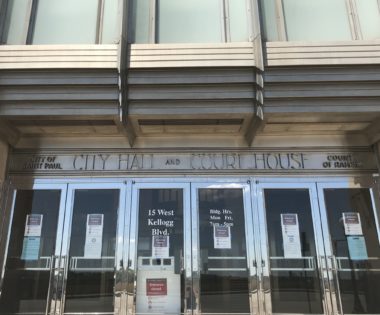Preventing Eviction: Systems change to support families in crisis
For many of us, living through a global pandemic has crystalized the importance of a safe, stable home. But this safe place of refuge is at risk for a significant percentage of households who have experienced a COVID-related job loss, pay cut, or illness. And as was the case before, the burden is being disproportionately carried by low-income families and households of color.
This makes our region’s eviction prevention efforts over the past several years all the more important. And as we reflect upon the successes of this work, we must recognize and address the particular challenges that this moment presents in order to avoid a deluge of evictions in the coming months.
Since 2017, we have worked on eviction prevention strategies with a broad array of partners with the goal of reducing evictions in the Twin Cities by 50%. In 2018, FHFund helped to launch the Ramsey County Housing Court Clinic in partnership with the Ramsey County District Court, Southern Minnesota Regional Legal Services, Volunteer Lawyers Network, the Dispute Resolution Center, Ramsey County Emergency Assistance, and Neighborhood House. This Clinic has implemented numerous court process changes to provide better information on services, enhance mediation offerings, and make it easier to get an expungement of the court record. It also made available a suite of financial, legal, and mediation resources at Housing Court. After the first full year of the Clinic, court statistics show that overall eviction judgements in Ramsey County decreased by 18% and expungements doubled per court calendar. Read more about this project and find key lessons learned.
In addition to the work at Housing Court, many of these same partners have expanded the availability of their services outside of court. Last fall, the court-based partners all brought their services into a community setting at Neighborhood House’s weekly Crisis Clinics in Saint Paul in order to provide critical resources upstream before an eviction was filed and improve the odds of preserving housing stability. This problem-solving approach shows that we can resolve housing emergencies without the need for an eviction filing, which damages a renter’s record and makes it more difficult to find new housing.
Both Anoka and Dakota Counties watched the changes in Ramsey County and decided to explore a similar approach in their jurisdictions. In 2019 we began working with Anoka and Dakota Counties to adapt the model, supporting similar court process changes and the addition of in-person court clinics in the suburban metro. The Anoka County District Court launched its housing clinic in January with Volunteer Lawyers Network, Central Minnesota Legal Aid, Judicare, Mediation and Restorative Services for Anoka County, and Anoka County Economic Assistance. Dakota County was preparing to launch a similar in-person clinic just as the courts were shut down due to COVID-19.
This regional approach to eviction prevention, implementing systemic changes to court procedures and adding wrap-around support services, is important progress as we strive to improve housing stability across the region. As partners now prepare for an anticipated influx of new eviction filings after the state moratorium ends, they are working together to find new ways to provide services at court under new social distancing guidelines.
But importantly, they are not waiting for courts to reopen. The years-long work among partners has built strong relationships that have helped them pivot to virtual consultations and allows them to help renter households navigate the various support systems – including unemployment insurance, emergency assistance, and other financial benefits – that can help them pay their rent and remain stably housed. Lawyers are helping renters understand their rights during and after the public health emergency. Mediators are helping landlords and tenants calm the waters and co-create solutions through Zoom meetings. Our partners are already seeing the great need and are working to resolve issues before they become eviction cases.
We must also address the economic reality that is the root cause of most evictions: lack of funds to pay rent. The vast majority of evictions were filed for nonpayment of rent even before the coronavirus pandemic hit our communities, and housing burdens have now further deepened for low-income families. While additional government supports, including unemployment insurance, are helping many people weather the current financial hardships, our safety net still has many holes and some of these new benefits are temporary and set to expire soon. This is why we’re working with Communidades Latinas Unidas En Servicio (CLUES) and Hennepin County’s Tenant Resource Center to help streamline the process of receiving emergency financial help and identify and fill gaps in assistance. This work builds on the research Family Housing Fund has been conducting to better understand emergency assistance policies and practices across the 7-county metro region, as well as our investment in measuring the impact of Saint Paul’s rent supplement pilot program.
We are hopeful that these efforts will help families in need right now while also informing policy makers about necessary systemic changes. But we must do more. As part of the Homes for All coalition, Family Housing Fund is advocating for $100 million to be allocated by the Minnesota legislature to housing assistance via the Family Homelessness Prevention and Assistance Program (FHPAP). We also support recently-introduced federal legislation to dedicate $100 billion to rental assistance nationally. These resources will be critical for ensuring the long-term housing stability – and health – of our most vulnerable community members.
The dramatic needs of this moment call us to act with urgency. We are heartened by the work of so many community partners in laying the foundation for a more humane, seamless, supportive system that helps improve housing stability in our region. But there is so much more to do not just to address the current crisis, but to create a just, equitable system that allows access to a stable home for everyone.
Interested in learning more or finding a way to get involved in eviction prevention? Contact us – we’d love to hear from you.
